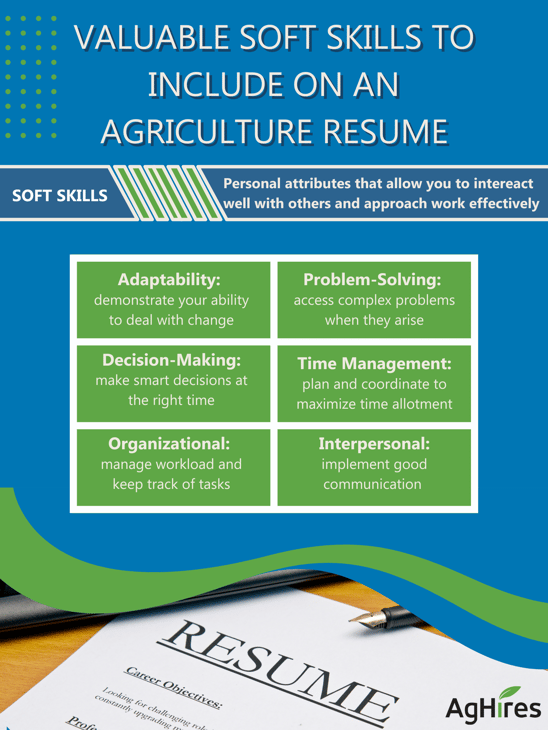
When writing a resume for a position in the agriculture industry, there’s a natural tendency to focus on technical skills, like the operation of machinery and farm equipment, agricultural engineering, or mechanics. While employers are looking for candidates with these skills, it’s also important for candidates to have the right set of soft skills.
Soft skills are the personal attributes that allow you to interact well with others and approach work effectively, such as teamwork or positivity. Showing employers you have the soft skills to succeed in agriculture will go a long way toward getting you that interview.
Employers in agriculture want to know that you can:
- Adapt
- Problem solve
- Make difficult decisions
- Manage time efficiently
- Use organizational skills
- Work well with others

These are five of the best agriculture soft skills to display on your resume. In this article we’ll explain what makes each of these soft skills valuable and provide examples of how you can include them on your agriculture resume:
Adaptability
Because of the ever-changing nature of the agriculture industry, adaptability is perhaps the most important soft skill to have on your resume. Conditions in the market and the climate can change rapidly, and if you aren’t able to adapt to shifting circumstances you could risk losing a crop, your profits, or both.
If you’re looking for a job in the agriculture sector, employers will want to see you’re a candidate that readily adapts to change. You can demonstrate your ability to deal with change by relaying a time you responded to changes in consumer needs or adjusted your methods to improve an outcome.
For instance, did you need to improve the irrigation systems in an exceptionally dry season? Did you use your resources to find additional buyers for your produce at a time when the market was saturated? Your responses to situations like these show how you’re able to adapt to change, and make good examples to include in your job application.
Here’s an example of how to demonstrate adaptability as a skill in your work experience section:
- Monitored a decrease in natural pollination over a 3-year period and directed the acquisition of 6 beehives to pollinate 4 acres of blueberry flowers, resulting in a 200% increase in yield
This is a good example because it relays a problem posed by changing circumstances, the candidate’s solution, and the positive outcome of their actions.
Problem-solving
Working in the agriculture industry, you need to be able to identify and solve problems quickly and effectively. This includes the ability to assess complex problems when they arise, analyze data, and think creatively to find appropriate solutions.
Showing employers you can use your theoretical and practical industry knowledge to solve problems will make them confident in your capabilities.
To demonstrate problem-solving skills on your agriculture resume, think of a couple of examples of problems you’ve encountered in your work, and use the STAR method to show how you handled any problems. STAR stands for:
- Situation
- Task
- Action
- Result
First, describe the situation or problem. For example, perhaps you discovered an invasive species was destroying a crop. The task in this case was to save the crop. What action did you take and what was the outcome of your action? Here’s how that might look in a bullet point:
- Observed significant reduction in organic crop health due to an increase in invasive species and responded quickly using biocontrol methods, resulting in a drastic decrease in the species population and a 93% crop retention rate
By highlighting problem-solving skills like this on your resume, you’ll show potential employers you’ll make a capable employee who’s ready to face any unexpected challenges that come their way.
Decision-making
Agricultural jobs often require workers to make difficult decisions based on limited or shifting information and within pressing time constraints. You might be faced with the decision to diversify agricultural systems, or delay planting.
Being able to make smart decisions at the right time can make a big difference in your profit margins and long-term success.
Showing employers you can make difficult decisions will make you a stronger candidate, so you should describe some tough or profitable decisions you’ve made in your resume.
Here’s an example:
- Made timely decision to exchange seed for a shorter season hybrid crop due to unprecedentedly wet conditions in 2019, managing to produce 100% of the average yield
Employers in the ag industry will value a candidate’s ability to make difficult decisions under pressure, so make sure to highlight this skill in your work experience section.
Time management skills
Time management is a critical skill for those working in the agriculture industry, as an agribusiness revolves around a seasonal workflow. Farmers need to be able to plan and coordinate their planting and harvesting. They also need to be able to manage their workers and keep track of everyone’s tasks and schedules.
Farmers need to work with distributors to coordinate transportation, storage, and packing. Agriculture businesses need to be able to keep track of inventory, shipments, and other logistical details. Completing all of these processes efficiently requires excellent time management.
Employers in agriculture will be more inclined to hire candidates who can demonstrate solid time management skills, as they will be able to streamline operations, save time, and ultimately increase profits.
So, how can you demonstrate your time management skills on your agriculture resume? Here are some tips:
- Describe any projects you’ve completed that involved time management. For example, if you coordinated a large event or managed a team of people, mention this on your resume.
- Use specific examples and numbers to demonstrate your time management skills. For instance, you could mention how you reduced shipping costs by 10% or increased efficiency by 20%.
Showing employers you’re adept at managing your time will make you a stronger candidate.
Organizational skills
Organizational skills are important for jobs in agriculture because they help ensure daily operations are completed efficiently. Good organizational abilities can help farmers and agricultural workers stay on top of their workload, meet deadlines, and keep track of important information.
Employers want to know you are able to manage your workload and keep track of all your tasks. Demonstrating your organizational skills reassures them that they won’t have to micromanage or keep tabs on your work for you.
You can demonstrate organizational skills by describing how you have managed your time and resources effectively in previous roles, or by mentioning organizational tools you have used.
For example, if you’ve used any kind of farm management software, like Agrivi, FarmERP, FarmLogs, or Granular, listing these under your experience or skills section can be a great way to showcase your organizational skills.
Here’s an example of how to demonstrate your organizational abilities on an agriculture resume:
- Implemented Granular to oversee daily operations, schedule and delegate tasks, and communicate with distributors, saving an average of 35 hours of labor per week
If employers know you’re organized, they’ll be more confident in your ability to get the job done.
Interpersonal skills
Even if you’re an introvert in the agriculture industry, you’ll need some good interpersonal skills. Agricultural businesses and farms are often collaborative ventures that require good communication and teamwork.
Good interpersonal skills can help you build strong working relationships with food producers, seed and agrichemical manufacturers, crop advisors, distributors, and retailers.
Your interpersonal skills can help you build rapport with customers and clients, which can lead to more business and greater profits. Additionally, interpersonal skills are key in resolving conflicts that arise in the workplace.
To demonstrate interpersonal skills on your agriculture resume, describe some experience that showcases your good communication, leadership, negotiation, teamwork, or conflict resolution skills.
For example:
- Trained 30+ seasonal workers in picking and processing fruit, caring for orchard grounds, and pruning trees
Including a point like this shows your leadership, teamwork, and management abilities, all qualities that make an effective employee.
Including interpersonal skills on your agriculture resume is important because it shows you can work well with others. This will make you more attractive to potential employers and help you land the job you want.
How to showcase soft skills on your resume
Now that you know the best soft skills to include on your agriculture resume, it’s time to consider how to include them in a way that will grab a hiring manager’s attention and make you stand out from the other candidates.
One way to include soft skills on your resume is to include them in your resume’s skills section. If you want to put more emphasis on your skills, choose a unique resume format that highlights your skills section.
Here’s an example of how you can list skills on an agriculture resume:
Skills
- Trimble
- FarmERP
- Tractor operation
- Harvesting and planting equipment
- Quality control
- Proper storage procedure
- Excellent communication skills
- Time management skills
- Problem-solving skills
While it’s fine to include 3 or 4 soft skills this way, it’s best to try to include them in your work experience section. This way you can provide the context for them and demonstrate how you’ve been able to use them.
Here’s an example of how to include interpersonal skills in your work experience section:
- Communicated with both management and farmhands, relaying information where necessary and smoothly resolving any issues that arose, contributing to a 97% worker satisfaction rate
When you include your soft skills as part of your work experience, remember to use action verbs that describe how you completed your work and numbers that can demonstrate how effectively you did it. These two simple techniques will make your resume much more compelling.
If you're still not sure how to include your agriculture soft skills on your resume, using an online resume builder can help you build a professional-looking resume and impress employers with minimal effort.
AgHires job website has over 10,000 jobs in agriculture, food production, horticulture, and other related industries. Start your agriculture job search at AgHires.com.






